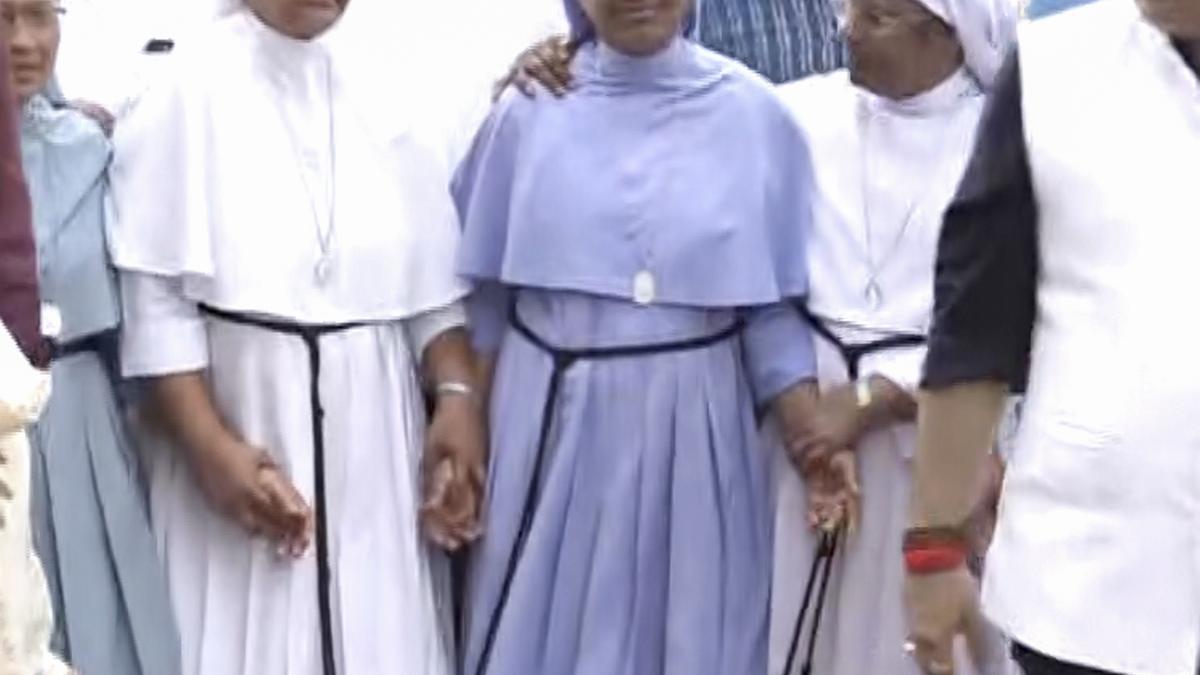
Two nuns from Kerala, who were arrested on the charges of human trafficking and forced religious conversion, being welcomed after they were released from Durg Central Jail in Durg, Chhattisgarh.
| Photo Credit: PTI
On July 25, when the Chhattisgarh police arrested two nuns from Kerala on charges of forced conversion and trafficking, political parties in the southern State sprang into action. In a rare, united show of urgency, the LDF and the UDF dispatched separate delegations to Chhattisgarh. The BJP is in power in Chhattisgarh; yet its Kerala unit also sent a team, determined not to be outdone. All their efforts paid off as the nuns were finally granted bail by an NIA court.
This wasn’t the first time that Christian missionaries from Kerala faced legal trouble or vigilante hostility in north India. However, what set this case apart, and gave it sharp political resonance, was that the nuns were Catholic. Their detention triggered anger, coming as it did just months ahead of two elections: one to the local bodies and another to the Assembly.
As Kerala’s third largest demographic group after Hindus and Muslims, Christians, especially Catholics, have long wielded significant influence in the State — not just in education, healthcare, and charitable initiatives, but also in politics and policymaking.
However, in the last few years, the community appeared to drift to the political margins. Attention turned inwards, with growing concerns over issues such as the massive wave of youth migration to the West. The Chhattisgarh episode thrust the Church back into the spotlight even as there remains ambiguity about its political alignment.
Historically, the Catholic vote was regarded a pillar of support for the Congress-led UDF, especially in the central Travancore region. But that relationship began to weaken after the fall of the UDF government. The death of Kerala Congress patriarch K.M. Mani and of senior Congress leader Oommen Chandy further deepened the disconnect.
The CPI(M)-led LDF was quick to seize the opportunity. By aligning with Kerala Congress (M), a splinter group with Catholic roots, it managed to break into the UDF stronghold in central Travancore. In the last Assembly elections, the LDF not only retained power, but also made significant inroads into Catholic-majority constituencies. The Church, however, did not remain silent. It challenged the LDF government on issues such as agrarian distress and wild animal attacks.
Trying to reclaim lost ground, the Congress in May named Sunny Joseph, a Catholic leader with strong ties across the Catholic dioceses of central Travancore and Malabar, as head of the party in Kerala. As the Congress holds just three of the 21 seats in central Travancore, it is hoping that this appointment will lead to its political revival.
Meanwhile, the BJP has been slowly cultivating the Catholic vote in Kerala. What began as an unspoken alignment on shared anxieties, such as ‘love jihad’ and ‘narcotic jihad’, gradually evolved into a strategic outreach effort. The party began inducting Christian leaders and building quiet channels with sections of the Church. In April 2023, Prime Minister Narendra Modi visited the Sacred Heart Cathedral Church in New Delhi and then met with top bishops in Kochi.
However, the honeymoon was short-lived. The violence against churches in Manipur severely strained this fledgling alliance. The BJP then attempted course correction by echoing the Church’s criticism of pro-Palestinian rhetoric from rival parties and by supporting the Kerala Catholic Bishops’ Council’s call for greater political engagement from Christians. The Waqf Board land controversy in Munambam also helped the party attract segments of the Catholic clergy and laity.
Recognising the growing political stakes, the Church has begun to assert itself more in public affairs. Yet beneath this assertion lies an internal dissonance. While a few clergy members appear willing to engage with the BJP, a large section remains cautious, primarily due to the party’s ties with Hindutva groups known for anti-Christian rhetoric.
Just as Kerala’s political class started to realise that Catholic votes are in play, the Chhattisgarh episode unfolded. For the Catholic Church, the arrests served as a wake-up call about how its clergy and members are perceived, especially in parts of north and central India.
The next two election cycles could determine how the Church chooses to position itself politically. For now, every party is on high alert, knowing that this once-reliable bloc is no longer guaranteed, but is very much worth fighting for.
Published – August 05, 2025 12:50 am IST
